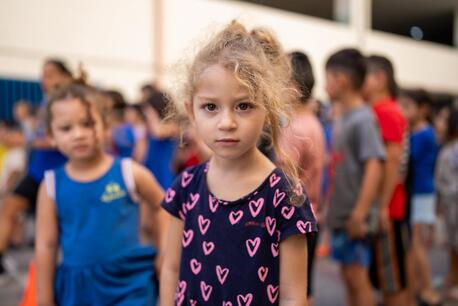
Inside the Largest Ever Humanitarian Convoy to Reach Syrian Refugees
The United Nations and Syrian Arab Red Crescent teamed up to deliver lifesaving supplies to displaced Syrians in Rukban makeshift camp near the Jordanian border.
This month, the United Nations and the Syrian Arab Red Crescent (SARC) carried out their largest and most complex joint humanitarian aid convoy, providing lifesaving humanitarian assistance to 40,000 displaced people at the Rukban makeshift settlement in southeastern Syria near the borders with Jordan and Iraq.
Yesterday’s bad weather gave us a glimpse of what families must endure throughout the winter here in #Rukban, southeast #Syria. Torrential rain and very muddy conditions meant that getting into the camp itself took longer than usual. pic.twitter.com/XeLv2raA7T
— Fran Equiza (@franequiza) February 8, 2019
Some 118 trucks filled with health and nutrition supplies, medical equipment, winter gear, sanitation and hygiene materials, educational supplies and children's recreational kits reached the outskirts of the remote desert camp on February 6.
The UN/SARC trucks also carried vaccines for approximately 10,000 children under the age of 5, as part of an emergency vaccination campaign against measles, polio and other diseases. The vast majority of the people stranded at Rukban are vulnerable women and children.
Offloading aid supplies by @UNinSyria & @SYRedCrescent started yesterday in #Rukban. We are joined by the community to help us offload from the big UN trucks into smaller ones that go into the camp. It’s a group effort but the bad weather makes it very challenging (vid:UN) pic.twitter.com/wH7TDbo9dZ
— Fran Equiza (@franequiza) February 8, 2019
Rukban is a no man's land. There are practically no services, no basic health care. Access to safe, clean water is very limited. Food prices have soared.
"This large-scale delivery of essential humanitarian supplies to the extremely vulnerable in Rukban could not have happened a moment too soon," said UN Resident and Humanitarian Coordinator Sajjad Malik. "The humanitarian situation there has been deteriorating due to harsh winter conditions and the lack of access to basic assistance and services. There have been reports of at least eight young children's deaths in recent weeks."
Many children in #Rukban still can't access the specialized healthcare they need. @UNICEF is delivering vaccines and basic health supplies to thousands of children in the remote camp.
— UNICEF MENA - يونيسف الشرق الأوسط و شمال إفريقيا (@UNICEFmena) February 14, 2019
We call for sustained and unconditional access to all children wherever they are. pic.twitter.com/tKAwaXO3Dc
Fleeing air strikes, Syrian families began arriving at the camp in late 2015, hoping to cross to safety in Jordan. Since Jordan closed its border in 2016, they have been trapped in the harsh desert in Rukban.
Conditions in the settlement are desperate. "Children are walking around barefoot through puddles and mud, in cold and continuous rain," said Andrej Mahecic, a spokesperson for UNHCR, the Refugee Agency. Early marriage for girls is commonplace. Many women and girls are terrified to leave their mud homes or tents as there are serious risks of sexual abuse and harassment.
We asked the children of #Rukban - what do you do during the day?
— UNHCR Syria (@UNHCRinSYRIA) February 7, 2019
--------- We go to school
We asked them what they want to do when they grow up?
They told us - ----------------⚕️----⚕️------------ teachers, doctors and engineers! pic.twitter.com/EoefMQ6abJ
Children didn't start the conflict in Syria, but they are paying the highest price. UNICEF is working to provide urgent assistance to children affected by violence in Syria, including the millions who have been forced from their homes.
Learn more about how you can help the children of Syria now.
Top photo: A humanitarian aid convoy organized by the United Nations and the Syrian Arab Red Crescent reached the Rukban makeshift settlement in the Syrian desert near the border with Jordan in February 2018. © UNICEF/UN0279377
HOW TO HELP
There are many ways to make a difference
War, famine, poverty, natural disasters — threats to the world's children keep coming. But UNICEF won't stop working to keep children healthy and safe.
UNICEF works in over 190 countries and territories — more places than any other children's organization. UNICEF has the world's largest humanitarian warehouse and, when disaster strikes, can get supplies almost anywhere within 72 hours. Constantly innovating, always advocating for a better world for children, UNICEF works to ensure that every child can grow up healthy, educated, protected and respected.
Would you like to help give all children the opportunity to reach their full potential? There are many ways to get involved.





